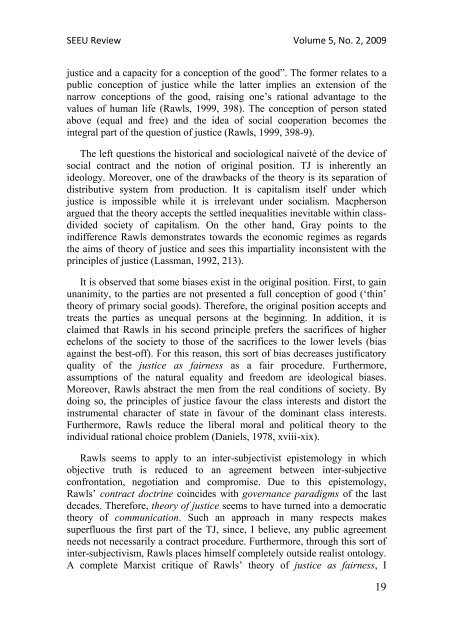SEEU Review vol. 5 Nr. 2 (pdf) - South East European University
SEEU Review vol. 5 Nr. 2 (pdf) - South East European University
SEEU Review vol. 5 Nr. 2 (pdf) - South East European University
You also want an ePaper? Increase the reach of your titles
YUMPU automatically turns print PDFs into web optimized ePapers that Google loves.
<strong>SEEU</strong> <strong>Review</strong> Volume 5, No. 2, 2009<br />
justice and a capacity for a conception of the good”. The former relates to a<br />
public conception of justice while the latter implies an extension of the<br />
narrow conceptions of the good, raising one’s rational advantage to the<br />
values of human life (Rawls, 1999, 398). The conception of person stated<br />
above (equal and free) and the idea of social cooperation becomes the<br />
integral part of the question of justice (Rawls, 1999, 398-9).<br />
The left questions the historical and sociological naiveté of the device of<br />
social contract and the notion of original position. TJ is inherently an<br />
ideology. Moreover, one of the drawbacks of the theory is its separation of<br />
distributive system from production. It is capitalism itself under which<br />
justice is impossible while it is irrelevant under socialism. Macpherson<br />
argued that the theory accepts the settled inequalities inevitable within classdivided<br />
society of capitalism. On the other hand, Gray points to the<br />
indifference Rawls demonstrates towards the economic regimes as regards<br />
the aims of theory of justice and sees this impartiality inconsistent with the<br />
principles of justice (Lassman, 1992, 213).<br />
It is observed that some biases exist in the original position. First, to gain<br />
unanimity, to the parties are not presented a full conception of good (‘thin’<br />
theory of primary social goods). Therefore, the original position accepts and<br />
treats the parties as unequal persons at the beginning. In addition, it is<br />
claimed that Rawls in his second principle prefers the sacrifices of higher<br />
echelons of the society to those of the sacrifices to the lower levels (bias<br />
against the best-off). For this reason, this sort of bias decreases justificatory<br />
quality of the justice as fairness as a fair procedure. Furthermore,<br />
assumptions of the natural equality and freedom are ideological biases.<br />
Moreover, Rawls abstract the men from the real conditions of society. By<br />
doing so, the principles of justice favour the class interests and distort the<br />
instrumental character of state in favour of the dominant class interests.<br />
Furthermore, Rawls reduce the liberal moral and political theory to the<br />
individual rational choice problem (Daniels, 1978, xviii-xix).<br />
Rawls seems to apply to an inter-subjectivist epistemology in which<br />
objective truth is reduced to an agreement between inter-subjective<br />
confrontation, negotiation and compromise. Due to this epistemology,<br />
Rawls’ contract doctrine coincides with governance paradigms of the last<br />
decades. Therefore, theory of justice seems to have turned into a democratic<br />
theory of communication. Such an approach in many respects makes<br />
superfluous the first part of the TJ, since, I believe, any public agreement<br />
needs not necessarily a contract procedure. Furthermore, through this sort of<br />
inter-subjectivism, Rawls places himself completely outside realist ontology.<br />
A complete Marxist critique of Rawls’ theory of justice as fairness, I<br />
19

















